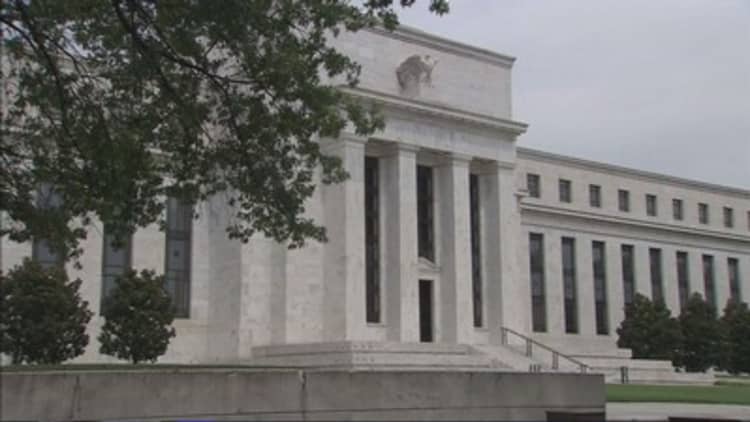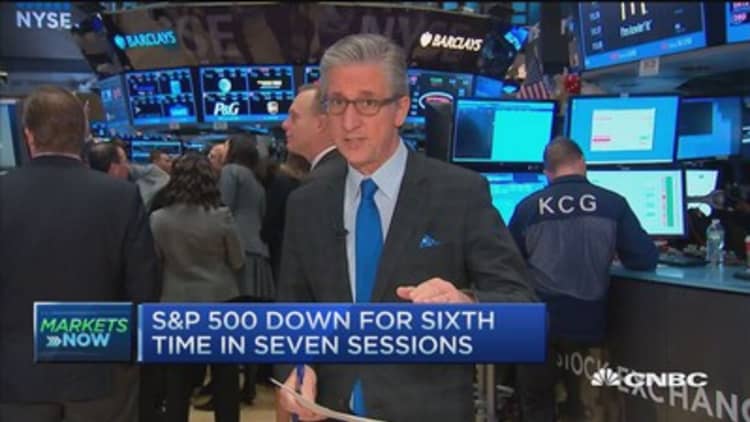


U.S. stocks closed more than 1 percent lower Thursday, under pressure from sharp declines in oil prices, as investors eyed several speeches from Federal Reserve officials. (Tweet This)
"I think we're down due to energy prices more than anything else. ... That, along with the fact the market is in a downward consolidation phase," said Peter Cardillo, chief market economist at First Standard Financial.
"What we're seeing is a market that is correcting and using some excuses — the oil price decline and some of the Fed comments as well," he said.
The major averages posted their worst day since Sept. 28, with the S&P 500 ending lower year-to-date for the first time since Oct. 22 and the Dow Jones industrial average off more than 250 points.
The S&P is down 0.6 percent for 2015. The Dow is off 2.1 percent for the year so far, while the Nasdaq composite is up more than 5.5 percent.
The three major indexes briefly pared losses in late-morning trade, as the Nasdaq composite tried for gains.
Declines in the S&P 500 and Dow Jones industrial average accelerated in midday trade after the two indexes fell below their 200-day moving averages.
Goldman Sachs and Caterpillar were the greatest weights on the Dow, which is on track for its worst week in ten.
All three major averages are down more than 2.5 percent for the week so far.
The Nasdaq composite fell 1.2 percent to end just above the psychologically key 5,000 level. Netflix lost nearly 3.5 percent.
Read MoreHulu seeks to sell stake to Time Warner: DJ, citing sources
Energy closed down nearly 2.4 percent as the greatest decliner in the S&P, which was lower for the sixth time in seven sessions.
"The real question for the market here is, are low oil prices an indication of global weakness or really, you have oversupply, (and you have to find) equilibrium," said Quincy Krosby, market strategist at Prudential Financial.
Crude oil futures settled down $1.18, or 2.75 percent, at $41.75 a barrel, after the U.S. government reported a stockpile build four times above market expectations.
Earlier, WTI fell to $41.63 a barrel, its lowest intraday level since Aug. 27. The commodity has lost nearly 10 percent in November alone, on pace for its worst month since July.
Read MoreOil prices melt down, could retest low
"The correlation between the S&P and oil continues to be very tight," said Art Hogan, chief market strategist at Wunderlich Securities.
"We sort of came into this morning with a mild upside bias but what's dragging us down is energy but it's also rethinking reset on the consumer after Macy's," he said.
Macy's closed nearly 1 percent higher after plunging about 14 percent Wednesday in its worst day since 2008, following mixed quarterly results.
"This clearly tells you there's a problem with the consumer," said Adam Sarhan, CEO of Sarhan Capital.
Nordstrom is due to post quarterly results after the close.
Before the open, Kohl's reported third-quarter earnings that beat by 6 cents, on revenue that also exceeded consensus. The retailer said same-store sales rose 1 percent, topping expectations of 0.6 percent.
On the data front, weekly jobless claims came in at 276,000, unchanged week-over-week, but higher than the expected 270,000.
"Jobless claims have been very solid," said Randy Frederick, managing director of trading and derivatives at Charles Schwab. "Jobless claims and nonfarm payrolls can't diverge too far and at some point the claims have to spill over int the jobs report."
The September Job Openings and Labor Turnover Survey (JOLTS) showed job openings were at 5.5 million, the Bureau of Labor Statistics said.
"The Fed looks at the JOLTS data, but it's a month lag," said Marie Schofield, chief economist and senior portfolio manager at Columbia Threadneedle Investments.
She said while the Fed is generally not concerned about the labor market, October's strong jobs report likely exaggerated employment conditions due partly to seasonal factors. Schofield expects a softer November report that could delay a rate hike to January, especially if data continues to show little inflation.
Thursday's session also featured several Fed speakers, including Fed Chair Janet Yellen, who delivered welcoming remarks at a conference in Washington, D.C., as investors continued to look for clues about the central bank's timing on hiking interest rates.
FOMC Vice Chair and New York Fed President William Dudley pointed towards a rate hike and said the pace of tightening should be gradual.
Another voting member, Fed Vice-Chairman Stanley Fischer, is scheduled to speak after the close.
"For the most part they seem to be on the same page, especially Dudley," Krosby said.
"There's still right now just a little bit of uncertainty. It's clear December is still 'live,'" she said.
Earlier, Chicago Fed President Charles Evans said the Fed is close to to reaching its employment mandate, but added he is less confident about reaching the inflation goal within a reasonable time frame.
Richmond Fed President Jeffrey Lacker said in another speech that caution should apply to the notion that policy should respond to signals of incipient financial instability.
St. Louis Fed President James Bullard — a non-voting member — also spoke on the economy, saying the Federal Open Market Committee's unemployment and inflation goals have been met.
Read MoreStreet betting big on banks before Fed liftoff
The chances of a Fed rate hike rose sharply after last Friday's jobs report came in better than expected. However, Sarhan said the recent problems within the retail and consumer discretionary space "indicate Main Street is not ready for a rate hike."
"I think it's uncertainty over the Fed that's driving the market at this stage of the game," he said.
Overseas, a speech by European Central Bank President Mario Draghi kept the door open for more economic stimulus.
Draghi's remarks briefly pushed the euro back below $1.07. The euro held near $1.079 in afternoon trade. The dollar traded slightly lower against major world currencies.
"The level of QE the ECB has undertaken has helped but it hasn't been enough," said Nick Raich, CEO of The Earnings Scout.
Read More Top blogger: Here's your best rising rate play
European equities closed sharply lower Thursday, with the pan-European Stoxx 600 index dropping more than 1.5 percent.
Asian stocks closed mixed, with the Shanghai composite falling about 0.45 percent and the Nikkei 225 gaining just 0.03 percent. Hong Kong's Hang Seng index was the outperformer, rising 2.4 percent.
In other corporate news, Liberty Media said it will recapitalize its common stock into three separate tracking stocks, known as Liberty Braves, Liberty Media, and Liberty Sirius.
Viacom matched estimates with adjusted quarterly profit of $1.54 per share, with revenue slightly below consensus.
Major U.S. Indexes
The Dow Jones industrial average closed down 254.15 points, or 1.44 percent, at 17,448.07, with Caterpillar the greatest decliner and United Technologies and Cisco the only gainers.
The closed down 29.03 points, or 1.4 percent, at 2,045.97, with energy leading all 10 sectors lower.
The Nasdaq Composite closed down 61.94 points, or 1.22 percent, at 5,005.08.
Treasury yields were little changed, with the benchmark 10-year yield near 2.32 percent, and the at 0.88 percent.
About five stocks declined for every advancer on the New York Stock Exchange, with an exchange volume of 878 million and a composite volume of nearly 4.0 billion in the close.
The CBOE Volatility Index (VIX), widely considered the best gauge of fear in the market, jumped above 18.
Gold futures settled down $3.90 at $1,081.00 an ounce.
— CNBC's Peter Schacknow and Reuters contributed to this report.
On tap this week:
Thursday
Earnings: Cisco Systems, Petrobras, Applied Materials, Nordstrom, Blue Buffalo, El Pollo Loco, Party City, Planet Fitness, Sunrun
6 p.m.: Federal Reserve Vice Chairman Stanley Fischer
Friday
Earnings: Tyco, Berry Plastics, J.C. Penney, WGL Holdings
8:30 a.m.: Retail Sales; Retail Sales ex-autos; PPI; PPI ex-food & energy
10 a.m.: Consumer Sentiment; Business Inventories
12:30 p.m.: Cleveland Fed President Loretta Mester
*Planner subject to change.
More From CNBC.com:






